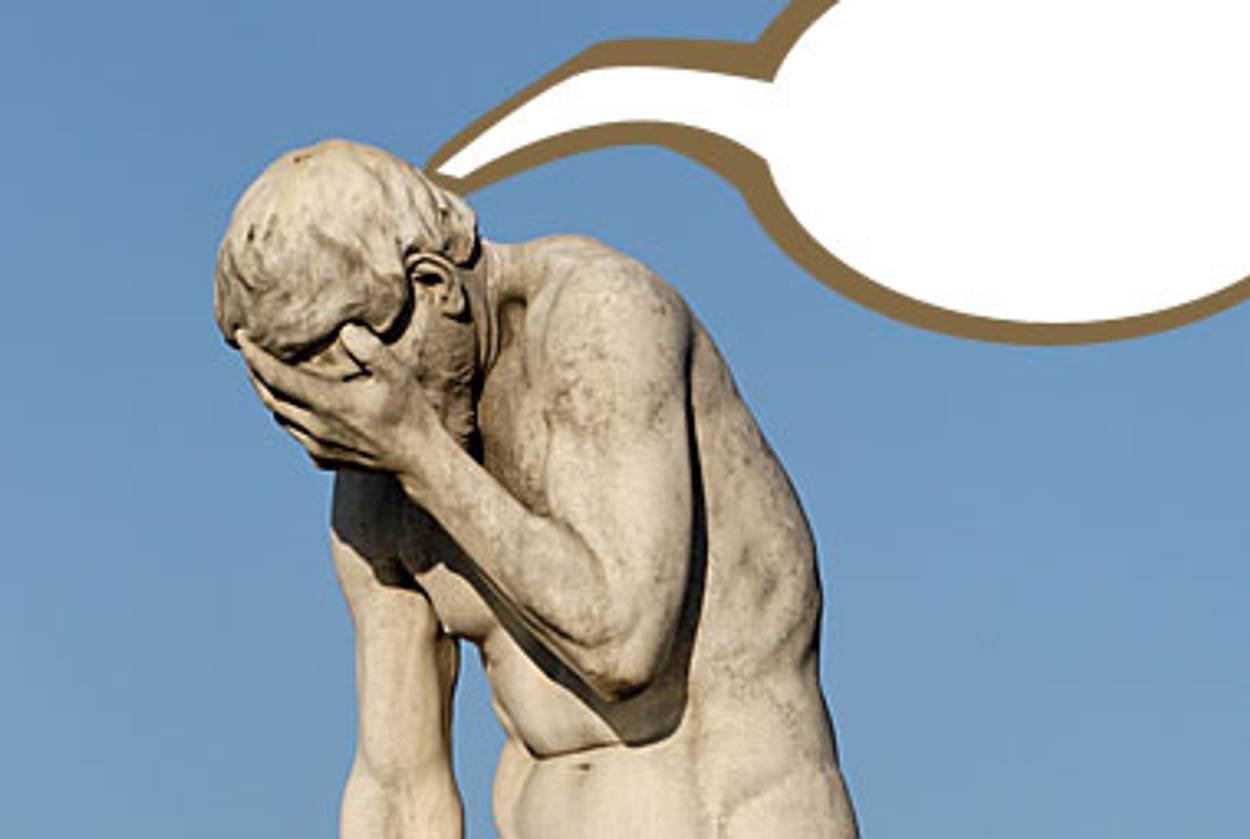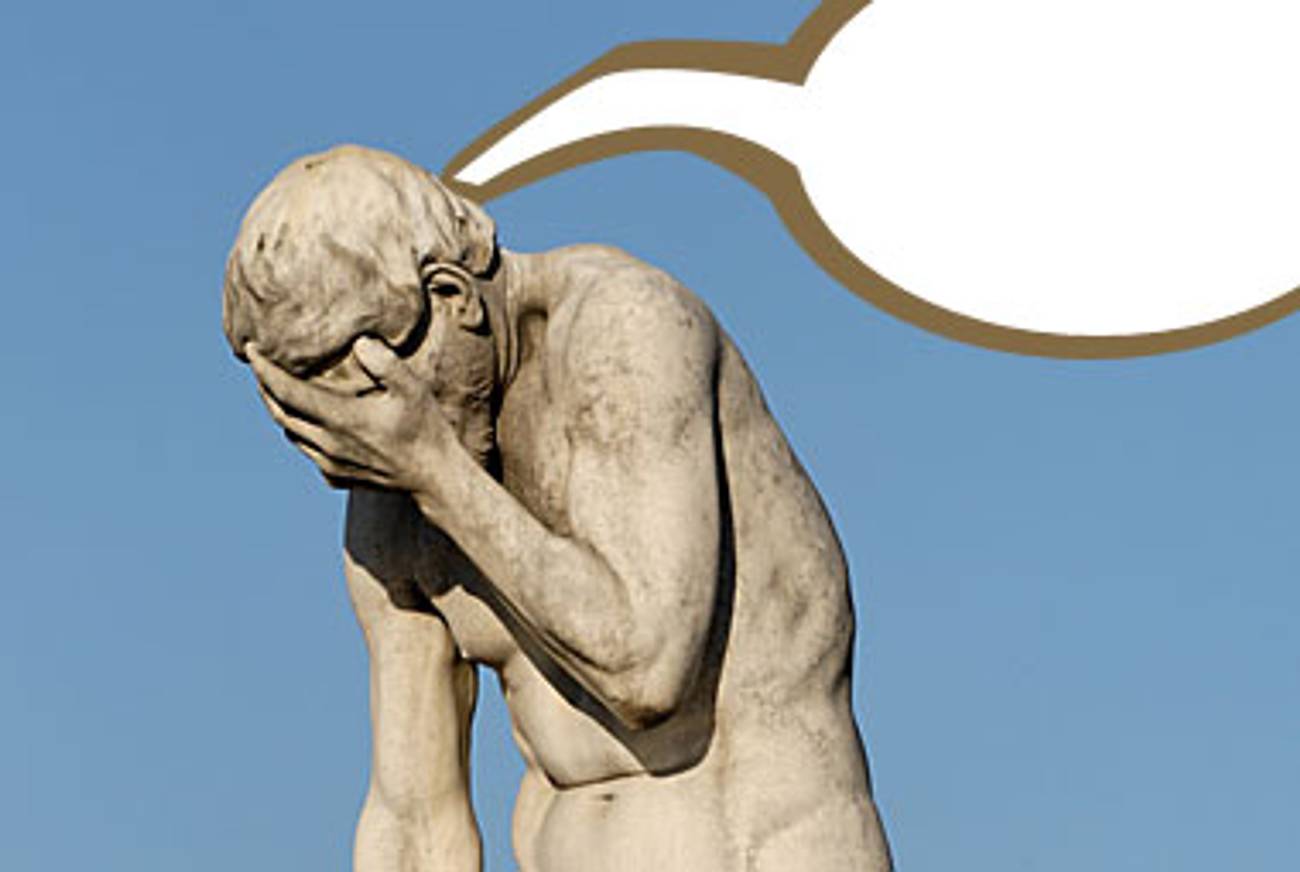Brought Low
Our readers share stories of humility




In his most recent rumination on the week’s Torah portion, which this Shabbat features Moses telling the children of Israel never to get too big for their britches, our Liel Leibovitz invited Tablet’s readers to share stories of humbling experiences of their own. We asked, and you delivered. Herewith, a selection from the submissions.
Drive-Thru Dry Cleaning
Stereotypical as it may sound, the women in my family are notoriously bad drivers. I am no exception.
One night, when I was in 10th grade, my family gathered for dinner at a local Israeli restaurant. I had just earned my learner’s permit, and after only two sessions of drivers-ed, was itching to show off my skills. It was dark out, and my father categorically rejected my pleas: I was nowhere near ready for night driving.
I relented momentarily, but when he left, started in on my mother.
How will I learn if you don’t let me practice?
You’ll be driving me around forever. Till I’m 30. Till I’m 60.
What will you do when you’re too old to drive, and I don’t know how?
If only to shut me up, she caved. As I backed out of the parking spot, however, she noticed my tentativeness, my jerkiness with the wheel. She ordered me to pull back in and let her drive. Frustrated and indignant, I obliged, but as I inched toward the new spot, my foot mistook the gas for the brake. Amidst her shrieks, it just stayed there, pressed on the gas, heavy as stone.
When I woke from the crash, my car was covered with shards of Plexiglas. If I hadn’t been buttressed by the front desk of “One Price Dry Cleaning,” who knows how far I would’ve gone.
After the shock wore off, the questions set in. What if it had been daytime and customers had been inside? What if I had chosen a parking spot in front of the café, where families were dining on the sidewalk? What if I had wounded myself, or worse, my mother?
As a child, she used to read Greek mythology to me before bed. Immediately, I thought of Icarus, the boy who failed to heed his father’s warning, and fell at the hands of the gods. In mythology, the lessons are often obvious, so much so, that even young children can understand them. Life is usually more complex, but in my case, things were being spelled out in pretty obvious terms: I was flying so close to the sun that nothing could have slowed me down other than a loud, resounding bang.
Parents, like God, take care of you, even when you forget you are being taken care of. They clothe you and feed you and give you advice, especially when you don’t want to hear it. In return, you nag them and ignore them and convince them that you know more than they do about the world. But even when you rack up their insurance bills by thousands of dollars, and almost kill them, they let you back on the road, and sit, petrified, shaking, in the passenger seat.
—Alexa Bryn
A Model of Humility
I’ve always been a little skeptical when I hear someone say they know exactly what they were put on earth to do. Really? You do? Maybe I feel that way because I don’t know what I’m meant to do, exactly. I don’t know what Marta Berk was put on this earth to do, but I know what she did do: she showed us all what it meant to be humble.
In her long life, Marta Berk endured adversity of the sort the world should never see again: the unspeakable horrors of World War II and the Holocaust. Her parents and all her siblings were murdered by the Third Reich. She might have logically had good reason to doubt the goodness of mankind and of the universe, perhaps even the existence of God. Yet, Marta was the happiest, most trusting, and most humble person I ever knew. I was never once with her that she didn’t say “Tank Gott!” for something.
I first met Marta a few years ago at the assisted living community where she was a resident. She was 90 years old, body failing, eyesight gone, but her mind was good. She had one small room, and her favorite possessions were her CD player and a colorful scarf given to her by a child. Marta lived simply. She never missed a Shabbat service at the assisted living center, and she loved to break into song at any point, and not only liturgical songs either: sometimes show tunes!
A large part of Marta’s attitude—maybe all of it—came from her life as a Jew. I almost said, the Jewish faith, but to Marta it was more than a faith or even a religion, it was a way of being. You see, Judaism commands us to be happy—and humble. Marta took the commandments of our tradition very seriously. In a section of the Mishna called Pirke Avot, one of the most studied Jewish texts, the rabbis ask, “Who is wealthy? The one who is happy with his lot.” Marta was the richest person I ever met.
The last time I saw Marta was in the hospital a few days before she passed away. I asked her if she needed anything, and she said, “What should I need?”
In spite of being handed some very hard knocks in life, Marta Berk was content. She never said an unkind word about anyone and was far more interested in other people than in herself. Her possessions were few and she took far less from life than she gave out.
After Marta passed away last year, her daughter gave me her mezuzah. It is a gift from Marta, a reminder of what it means to live as a Jew.
—Kim Phillips
A Mother’s Meekness
Thanks for sharing your perch. Your timing was perfect. An hour before I read your piece, my son called to tell me that his longtime partner just gave birth to their second boy! Mom and baby are healthy and the expanded family has already returned home from the birthing center. I am so proud of them all, so relieved and happy. But will they have the infant circumcised? This question of compliance with the Covenant is, as yet,unanswered, and I am humbled before it. After considerable debate the interfaith couple had their first son circumcised by a local pediatrician, and I really want them have this new baby circumcised as well. But I have an equally powerful urge not to pressure his non-Jewish mom and nonpracticing dad about it, so I’m awash in that special meekness fueled by ambivalence and impotence. I’m not sure it’s what Moses had in mind.
But that’s not all. (You asked, right?) Before I got to your discussion of Moses’s admonition to us, I read Adam Langer’s reflections on what it means to be a Jewish writer. Oy. I’m not only a Jewish writer, but I’m a female Jewish writer pushing 70 who pens mere mysteries as opposed to literary fiction. Talk about humility. Recently I completed four-and-a-half years of work on a historical mystery featuring explicitly Jewish themes and characters and peppered with Yiddish and Ladino phrases. I sent it off to my wonderful albeit non-Jewish agent (is there a theme here?) who may or may not deem it or me marketable. These are humbling times for many people and writers, even Jewish ones, are no exception.
—Jane Isenberg
From the editors of Tablet Magazine.